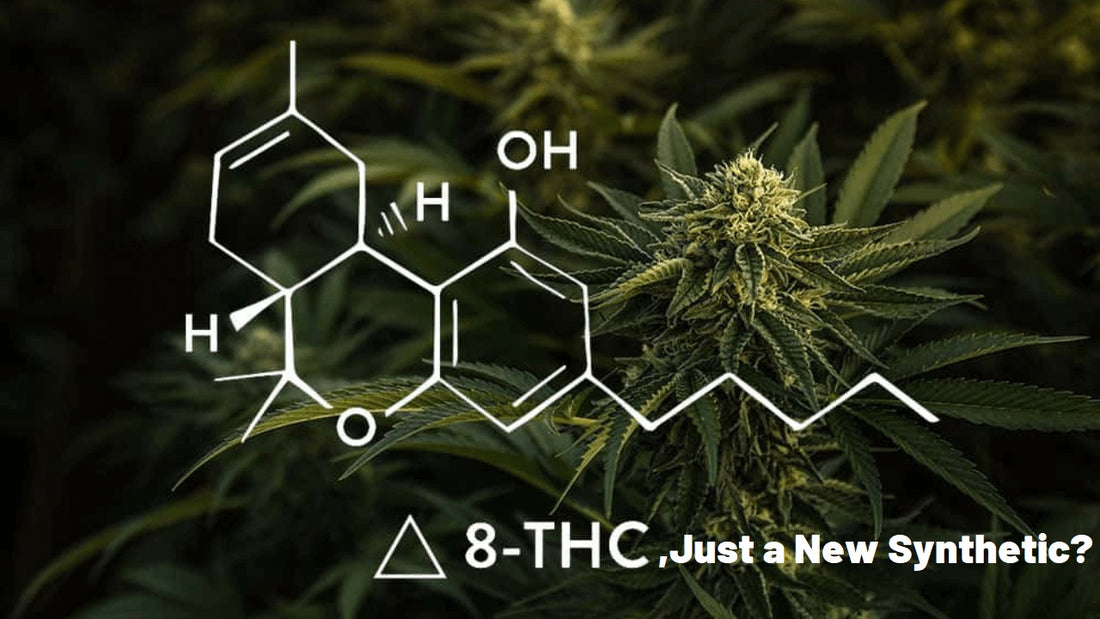The cannabis plant contains traces of delta-8 THC, a naturally occurring cannabinoid. Since the demand has been way higher than the manufacture of naturally occurring THC some producers extract the abundantly available cannabidiol, or CBD, from the plant, and then use an acid-conversion chemical process that employs a variety of chemicals to convert the chosen molecule into delta-8 THC. Hence, chemically increasing the production of delta-8. Now you might be wondering if the delta 8 THC substance you are hearing about is therefore natural or synthetic.
The psychoactive cannabinoid known as delta-8 tetrahydrocannabinol, or Delta-8 THC, interacts with the body's endocannabinoid system to have biologically regulating effects. Since delta-8 THC and delta-9 THC share the same number of atoms in their chemical structures, they are isomers of each other. The main distinction between the two cannabinoids is that delta-8 has about half the potency of delta-9, which results in "mellower" effects. Both cannabinoids bind to CB1 and CB2 receptors.
What is a synthetic
By combining two or more components, synthetic materials are created artificially. Typically, this entails igniting a chemical reaction between two or more components, as is the case with most polymers. Designer molecules created by humans called synthetic cannabinoids to attach to the same receptors on brain cells as natural cannabinoids. Synthetic cannabinoids are wholly artificial and manufactured, despite the fact that they mimic a natural substance to produce similar results in the human brain. They are thought to have unpredictably harmful consequences and could be quite dangerous.
Is delta-8 a natural or synthetic substance?
As stated in the previous section, only trace levels of delta 8 THC, a naturally occurring substance, are found in cannabis and it is not enough to meet the demand. It used to be necessary to extract and concentrate huge amounts of marijuana in order to obtain any appreciable amounts of delta 8 THC. There was minimal public interest in 8 THC because these items were both pricey and illegal. However, with further studies and research in this area, things are changing.
There have been advancements in the research about extracting maximum amounts of delta-8. the large amount of the 8 THC in hemp may now be isolated and extracted using brand-new techniques developed by scientists. They are less expensive as compared to most delta 9 THC products and are permitted under the 2018 Farm Bill (in the majority of states). It is not synthetic because 8-THC is a naturally occurring cannabinoid, even if it is produced through natural isomerization methods.
What are K2 and Spice?
K2/spice are well-known synthetic cannabis variations. These synthetic compounds resemble those in cannabis and are produced in laboratories. Consuming them causes the human brain to experience psychedelic effects.
There are more than 100 distinct synthetic cannabinoids. K2/spice binds to cannabinoid receptors, which are proteins found throughout the body when it is inhaled. The result is a "high." K2/spice, however, binds to these receptors far more effectively than the substances naturally present in cannabis. There may be detrimental impacts as a result.
If you are concerned about the health impacts of K2/spice, you should take note that both can vary from being extremely harmless to almost fatal. It is all related to which kind of chemicals are used in the process to create these synthetic compounds. It is mandatory to do proper research before consuming.
How is delta-8 THC different from K2 and spice?
Delta-8 THC along with various other cannabinoids found in hemp are referred to as "classical cannabinoids" and have very identical chemical structures. The "non-classical cannabinoids" in K2, Spice, and other synthetic cannabinoids all have molecular structures that are distinct from those of traditional cannabinoids as mentioned above. Their amount of intoxication also differs according to the methods and chemicals utilized in the lab to produce them.
Synthetic cannabis mixtures with highly intoxicating and potentially harmful ingredients are known by the names K2 and Spice. Similar to the ones mentioned in the above section, they interact with the endocannabinoid system, but they bind to CB1 and CB2 receptors more readily and powerfully, producing a more potent high. This is what separates delta-8 from K2/spice. Delta-8 is a naturally occurring substance, unlike K2 and spice which are synthetically produced in labs and can leave major health hazards.
Key Takeaways
A naturally occurring cannabinoid by the name of delta 8 THC, CBD, and other phytocannabinoids all have the same basic cannabinoid structure. Because of this, delta 8 THC is much safer than the synthetic cannabinoids present in weed and marijuana products like K2 or Spice. It is not wrong to say that delta-8 is legal, safe, and naturally sourced.

